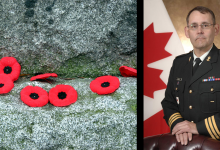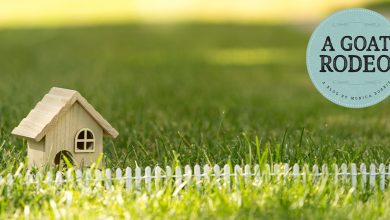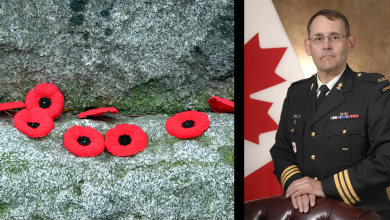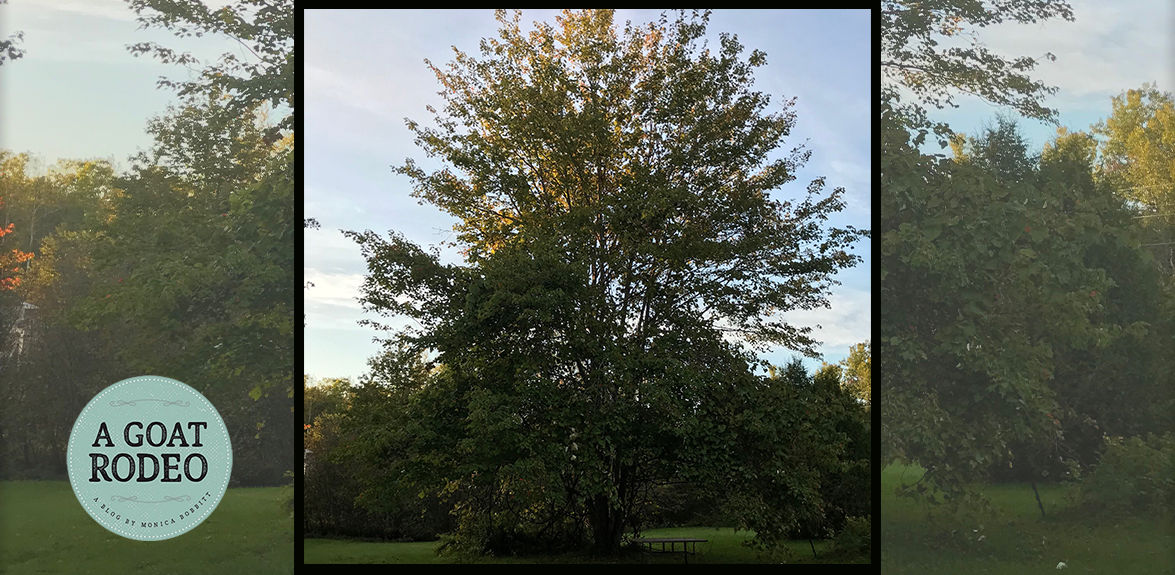
There’s a stately maple tree that towers over my mother’s front yard. I can’t tell you exactly how old it is, but it was there when my parents bought the property in 1984. Shortly after we moved in, my father transplanted several trees from his grandparents’ old farm a few kilometres down the road.
Cedars, lilac bushes, a Norwegian maple his grandmother had purportedly brought home with her on the train from Alberta, and a grapevine he planted at the base of the original maple tree. The grapevine and maple became so entwined over the years; it’s hard to distinguish one from the other. As the years passed, the grapes thrived under the canopy of the maple leaves. In the fall, as the leaves on the maple turn crimson red, the clusters of grapes turn a deep plum, marking the end of one season and the beginning of another.
Share Stories

My father wasn’t sentimental about many things. But he was about those trees, especially the one he fondly referred to as his grapple tree. I often wonder why he chose to plant the grapevines right beside the maple tree. It never occurred to me to ask him, but I wish I had. There are so many things I never asked him, so many things he never told me; things that once seemed unimportant take on a new significance now that he is gone.
My dad died two years ago, seven months after being diagnosed with lung cancer. He was just one of approximately 277,000 Canadians who died that year. Like so many of the others, my father was totally unprepared for his death.
Death was a taboo subject in my family. We never discussed death or grief openly. When a loved one died, you just picked yourself up and kept on going. And you most certainly didn’t discuss it. Why talk about something that made you so sad? I could never discuss my grief with my parents after my husband died. The subject was always quickly changed. “No sense moping,” my father would say as he hastily left the room.
Ensure You Are Prepared: Spare Your Family More Pain
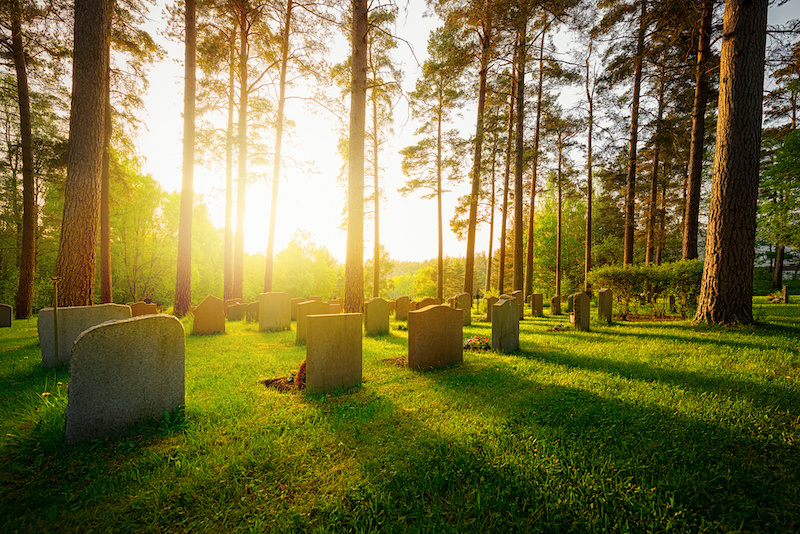
When my father was diagnosed with stage four lung cancer, I discovered not only did he not have a will; he had no end of life or funeral plan. Whenever I brought it up, he’d brush me off. “We don’t need to worry about that for a long time yet,” he say, changing the subject to the news, the weather, anything other than his own mortality.
My father did not die a good death. To say otherwise would be a denial of the truth of his difficult final months. Diagnosed far too late in an over-burdened and broken health care system, my father was shuffled from doctor to doctor, with none of them ever fully explaining his prognosis to him. That grim task was left to me, a responsibility that never should have been placed on my shoulders.
When I was still finding my way as a widow, I became a parent and caregiver to my parent. It was left to me to navigate the labyrinth of paperwork and planning a that death brings with it, whilst at the same time trying not to upset my terminally ill father. There were times I felt like I was walking through a minefield of trying to manage his care while at the same time trying to plan for his inevitable death; all without him ever actually acknowledging he was dying.
Death is an inevitable

Death is an inevitable fact of life, and yet it is a subject so many, like my father, are reluctant to discuss. Most couples have no idea what their spouse’s dying wishes are, let alone their aging parents. We avoid the topic because it’s uncomfortable and because it makes us sad. No one wants to think about someone we love dying.
Death is a very sobering thought. But it is also a reality we will all face at some point in time. If we are fortunate, it is a reality that won’t happen until we reach a ripe old age. But of course, most of us won’t be that fortunate. Death rarely comes to take us gently in our sleep when we are 100. It often sneaks up on us when we least expect it. In truth, death is never gentle, especially for those it leaves behind. It’s excruciatingly painful, and it is an emotionally and physically exhausting process.
It is vitally important that we are able to have a conversation about death. Each one of us will die someday. No exceptions. When we talk about death, we are really talking about life. When we recognize and accept our own mortality, we more deeply appreciate the time we do have.
The journey to the end of our life matters, and that journey begins when we are born. Attitudes towards death and grief begin to form in childhood, with the family as the first and primary source of those attitudes. What parents say or don’t say to children about death will very much influence their attitudes towards death when they are adults.
Be Brave – Have the Tough Conversations
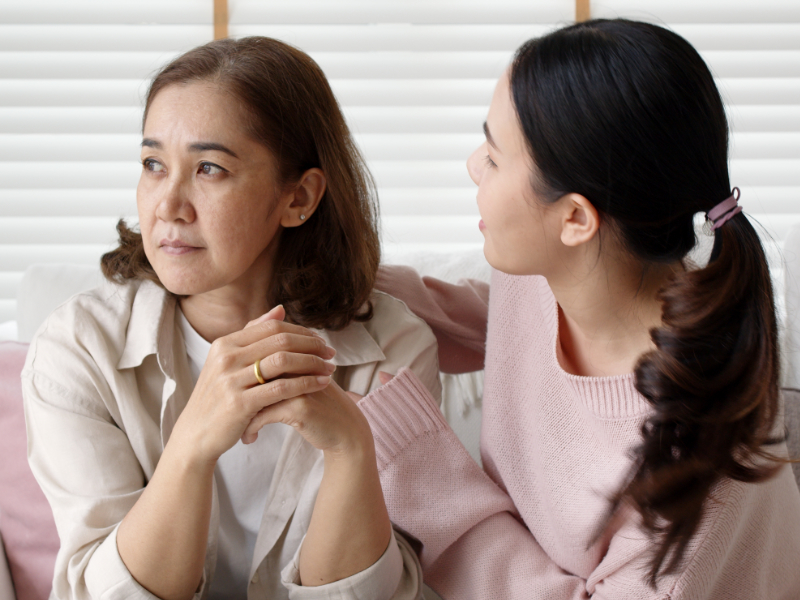
Death won’t wait for you to accept it or make peace with it. And it certainly won’t wait for you to get things done. So don’t make the mistake my father made. Don’t put off having those tough conversations, thinking you have time. You truly never know when you will get that phone call that irrevocably changes your life. Be brave enough to have a conversation that matters now, before it is too late.
A few weeks ago, Hurricane Dorian tore through Nova Scotia, knocking down trees and leaving many without power for days. Miraculously, my father’s grapple tree was unscathed. The day before the storm hit, my brother sent me a text saying “I just spent hours looking for the keys to Dad’s generator. I found lots, but not the one I needed.”
Yet another secret Dad took with him to his grave. Questions without answers, stories without endings. We need to talk about death.





